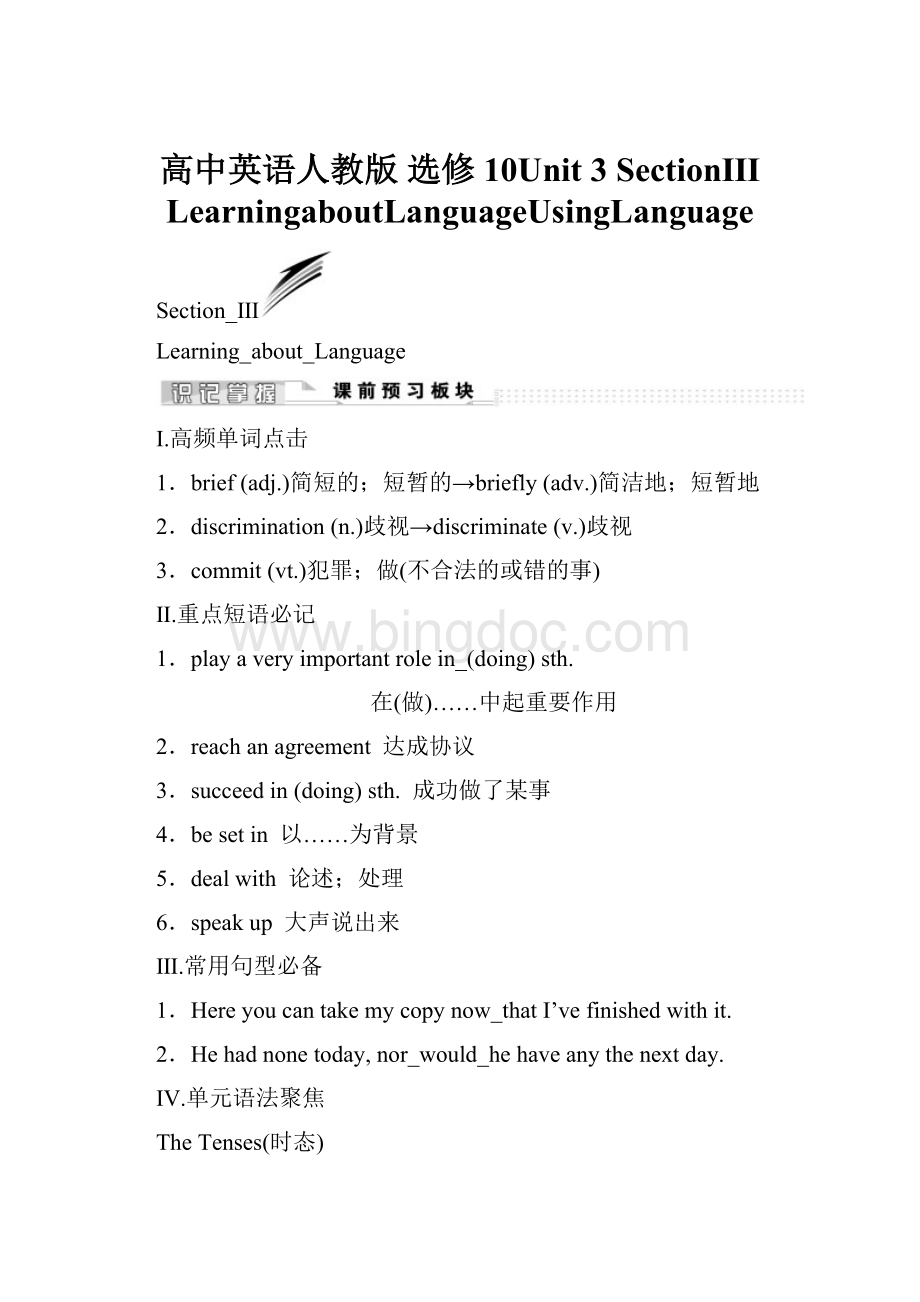高中英语人教版 选修10Unit 3 SectionⅢ LearningaboutLanguageUsingLanguage.docx
《高中英语人教版 选修10Unit 3 SectionⅢ LearningaboutLanguageUsingLanguage.docx》由会员分享,可在线阅读,更多相关《高中英语人教版 选修10Unit 3 SectionⅢ LearningaboutLanguageUsingLanguage.docx(18页珍藏版)》请在冰点文库上搜索。

高中英语人教版选修10Unit3SectionⅢLearningaboutLanguageUsingLanguage
Section_Ⅲ
Learning_about_Language
Ⅰ.高频单词点击
1.brief(adj.)简短的;短暂的→briefly(adv.)简洁地;短暂地
2.discrimination(n.)歧视→discriminate(v.)歧视
3.commit(vt.)犯罪;做(不合法的或错的事)
Ⅱ.重点短语必记
1.playaveryimportantrolein_(doing)sth.
在(做)……中起重要作用
2.reachanagreement达成协议
3.succeedin(doing)sth.成功做了某事
4.besetin以……为背景
5.dealwith论述;处理
6.speakup大声说出来
Ⅲ.常用句型必备
1.Hereyoucantakemycopynow_thatI’vefinishedwithit.
2.Hehadnonetoday,nor_would_hehaveanythenextday.
Ⅳ.单元语法聚焦
TheTenses(时态)
brief
(1)adj.简短的;短暂的;简单的
Thereisabriefmeetingtomorrow.
明天有个短会。
tobebrief 简而言之
Tobebrief,wecan’tacceptsuchterms.
简单地说,我们不能接受这样的条件。
(2)n.任务;摘要
inbrief 简单地说;简明扼要的
Inbrief,hewascareless.
简单地说,他粗心大意。
brieflyadv. 短暂地;简短地
简而言之
Toputitbriefly,themeetingwasadisaster.
简而言之,那次会议就是一次灾难。
inbrief,inshort
(1)inbrief着重于重点突出,不拖泥带水。
(2)inshort多用来在较长叙述之后长话短说,带有“综上所述”的意思。
[即境活用1] 用brief的短语填空
(1)Thereisnotmuchtimeleft,soI’lltellyouaboutitin_brief.
(2)To_put_it_briefly/Briefly_speaking/To_be_brief,_letmetellyouwhathappened.
1.succeedindoingsth.成功地做某事
Hesucceededingettingaplaceatartschool.
他被艺术学校录取了。
Riosucceededinhostingthe2016SummerOlympics.
里约成功举办了2016年夏季奥运会。
succeed
successfuladj. 成功的;有成就的
besuccessfulindoingsth.成功地做某事
successn.[U]成功;[C]成功的人或事
Whowillsucceedtotheestate?
谁将继承那笔遗产?
WhosucceededKennedyasPresident?
接替肯尼迪任总统的是谁?
[即境活用2] 句型转换
Theymanagedtosavethedrowningchild.
=They_succeeded_in_saving_the_drowning_child.
=Theyweresuccessfulinsavingthedrowningchild.
2.besetin以……为背景
ThestorywassetinShanghaiinthe1930s.
这个故事以二十世纪三十年代的上海为背景。
ThefilmrecordsthelifeoffarmerssetintheFirstWorldWar.
这部电影记录了以一战为背景的农民的生活。
setabout开始(某工作);着手做某事(doingsth.)
setoff 开始;启程(for);爆炸;燃放
setout出发上路;开始做(todosth.)
setup设置;建立
setaside把……放在一边;搁置;留出
TheyhavesetoffforShanghai.
他们已出发到上海去了。
Isetasidemyovercoatandtookoutmysummerclothes.
我把大衣放起来,取出了夏天的衣服。
[即境活用3] 介、副词填空)
(1)Thefamilyhavesetasidesomemoneyforthejourney.
(2)Thedoctorssetaboutsavingtheinjuredthemomenttheyarrived.
(3)Don’tsetoffthefireworksinthecity.
(4)Theysetout/offforTianjinthenextday.
(5)Anewgovernmentwassetupafterthecivilwar.
1.Hereyoucantakemycopynow_thatI’vefinishedwithit.
既然我已读完,你可以拿我这本。
nowthat由于;既然,表示原因,引导原因状语从句,口语中that可以省去。
Nowthatyouhavegrownup,youmuststopthischildishbehavior.
既然你已长大,就不要再有这种孩子气的行为。
Nowthatyouareanadult,youshouldthinkaboutyourfuturecarefully.
既然你已是个成年人了,你应该仔细地考虑一下你的将来。
[即境活用4] 完成句子
Now_that_he_is_so_rude_to_us(既然他这么粗鲁地对我们),Ithinkwehavetopunishhim.
2.Hehadnonetoday,nor_would_hehaveanythenextday.
他今天没有午餐,接下来的任何一天也不会有。
norwouldhe...是nor引起的表示部分倒装的句子。
否定副词或含有否定词的介词短语置于句首时,主句须用部分倒装。
如:
seldom,never,little,hardly,not,nowhere,nosooner,innoway,bynomeans等。
NeverhaveIseensuchagoodfilm.
我从未看过这么好的电影。
Bynomeansshouldhebeleftalone.
他绝不该被单独留下。
Wedidn’tknowthenews;nordidwecareaboutit.
我们不知道这一消息,我们也不在乎它。
[即境活用5] 把下列句子改成倒装句
(1)Youcanfindsuchabeautifulplacenowhereelse.
Nowhere_else_can_you_findsuchabeautifulplace.
(2)Heknewlittleofthematter.
Little_did_he_knowofthematter.
(3)Icouldhardlysayanythingatthatmoment.
Hardly_could_Isayanythingatthatmoment.
时 态
一、英语中动词的时态一共有16种。
现以动词write为例将英语的16种时态列表如下:
时态
一般
进行
完成
完成进行
现在
write/writes
am/is/arewriting
has/havewritten
has/havebeenwriting
过去
wrote
was/werewriting
hadwritten
hadbeenwriting
将来
shall/willwrite
shall/willbewriting
shall/willhavewritten
shall/willhavebeenwriting
过去将来
should/wouldwrite
should/wouldbewriting
should/wouldhavewritten
should/wouldhavebeenwriting
二、时态的考查是高考的热点,高考主要考查8种时态的形式和用法,详见下表:
时态
表示
例句
注意
一般现在时
现在经常性、习惯性的动作
IreadEnglisheverymorning.
▲时间、条件和让步状语从句中要用一般现在时或现在完成时代替一般将来时。
如:
Iwon’tgoswimmingifitrains.
▲here,there,now,then等开头的倒装句要用一般现在时代替现在进行时。
如:
Look!
Herecomesthebus.
客观真理、普遍公理、科学事实
Thesunrisesintheeast.
现有的兴趣、爱好或能力,或者现存的性质、特征或状态
Helikesplayingfootball.
Thesituationisencouraging.
介绍故事梗概、剧情,用于新闻标题
Yangmeetsjournalists.
按时刻表将要发生的动作(只限于少数动词,如:
come,go,leave,arrive,begin,start,takeoff,return,stop,open,close等)
Thetrainleavesat4:
30pm.Themeetingstartsthisafternoon.
一般过去时
过去经常性、习惯性的动作或状态
Heoftencried
whenhewas
aboy.
▲时间、条件和让步状语从句中要用一般过去时代替过去将来时。
如:
HesaidthatifIwentthere,hewouldgotoo.
▲表示过去经常发生的动作,也可用“usedto do...”和“woulddo...”。
如:
Theoldmanused_to_climbthehillbehindhishouse.
过去某时的动作或状态
Iwenttothebankjustnow.
用于Ididn’tknow...或Iforgot...,表示事先不知道或不记得,但现在已知道或记得的事情
Ididn’t_knowyouwerehere.
Sorry,Iforgotto
bringmybook.
一般将来时
现在看来以后要发生的动作或存在的状态
Tomwill_comenextweek.
Hewill_be_heretomorrow.
▲几种常见将来时表达的区别:
1.begoingto表示打算最近或将来要做某事,或有某种征兆要发生某事,不用于有if条件句的主句中。
Iwill_gofishing
ifitisfine.Itis_goingto_rain.
2.betodosth.表按计划安排即将发生的动作,还表示吩咐、命令、禁止、注定等。
Nooneis_toleavewithout
thepermissionofthepolice.
3.beabouttodo不与具体的时间状语或状语从句连用。
Thecompetitionis_about_to_start.
4.will/shall表示未事先考虑过,即说话时临时做出的决定。
事物的固有属性或必然趋势
Oilwill_floatinwater.
Fishwill_die
withoutwater.
对将来某个动作
的安排、计划
Heis_going_to_
speakonTV
thisevening.
现在进行时
此时此刻正在发生的动作
I’mstudyingEnglishnow.
▲不宜用进行时的动词:
感
觉类:
look,smell,feel,sound,taste,see,hear
情感类:
like,love,prefer,admire,hate,fear
心态类:
wish,hope,expect,want,need,believe,think,understand,agree,know,remember,forget
所有类:
have,contain,own,hold(容纳),belongto
现阶段正在发生的动作
Weare_buildingoursocialism.
与always,forever,constantly,continually连用,表示赞赏或厌恶等感情色彩,但并非强调动作正在进行
Heis_alwayshelpingothers.
Sheis_alwaysforgetting
something.
按计划、安排近期发生的动作(只限于come,go,leave,arrive,start,move,sail,fly,travel,stay等)
Aforeigneriscomingto
visitourschool.
I’mleavingforBeijingtomorrow.
过去进行时
过去某一时刻或阶段正在发生的动作
Hewas_watchingTVthistimeyesterday. Itwas_rainingthewholemorning.
▲过去进行时可用来描绘故
事发生的背景:
Thewindwas
blowinganditwas_raininghard.
与always,forever,constantly,continually连用,表示赞赏或厌恶
等感情色彩
ComradeLeiFengwas_alwaysthinking_ofothersneverthinkingofhimself.
过去计划、安排好的将来动作(只限于come,go,leave,arrive,start,move,sail,fly,travel,stay等)
Hesaidhewas_leavingthenextday.
Iwastoldthetrainwasstartingsoon.
过去将来时
过去某一时刻后将要发生的过去动作或过去的意图、打算(主要用于宾语从句中)
Shewassure
shewould_succeed.
Ithoughtyou
would_come.
▲把一般将来时中的助动词变成过去式,便成了过去将来时的表达形式
现在完成时
现已完成或刚刚完成且对现在有影响的动作
Ihave_finishedmyhomework.
▲没有包括“现在”在内或不是截止“现在”为止的时间状语不能与现在完成时连用
▲短暂性动词的肯定式不能与时间段连用
▲“inthepast/last+时间段”
要与现在完成时连用
▲havegoneto表示人在所指
地方的路上或已在所指地方;havebeento表示人曾到过所指的地方,但现在不在所指的地方了
发生在过去的动作,但已成为现在的经历或经验
We’veallplayedwithsnowandice.
始于过去持续至今,也许延于将来的动作或状态
He’s_lived
heresince2000.
I’ve_taughtEnglishfor15years.
将来某时先要做完的动作(只限于时间和条件状语从句)
Don’tgetoffthebusuntilithas_stopped.
到目前为止的一段时间,多少次或第几次做某事
He’s_beentoBeijingseveraltimes.
It’sthethirdtimethatI’ve_seenthefilm.
过去完成时
过去某时间前已发生的动作或情况
Marxhad_learned
someEnglish
beforehecame
toLondon.
▲过去完成时必须以过去某一时刻为基点,即“过去的过去”。
因此只有在和过去
某时或某动作相比较时才用到它
▲before,after本身“前”“后”明显,因此可用一般过去时代替过去完成时。
或同一主语连续几个动作时,只用一般过去时即可。
如:
He(had)_left
beforeIarrived.
过去某动作前已发生的另一动作
Thetrainhad_leftwhenIgottothestation.
始于过去持续至过去另一时间,也许延续下来的动作
Hesaidhehad_beeninthePartyfor10years.
过去未曾实现的意图、打算或希望(只限于think,want,plan,mean,intend,hope,expect,suppose等动词)
Ihad_plannedtoseeyouyesterday,buttherainpreventedme.
三、与动词时态连用的固定句式
1.This/Itisthefirst/second...time+that从句。
that从句一般用现在完成时,如果把前边的is改为was,则that从句用过去完成时。
ThisisthefirsttimeIhavecomehere.
这是我第一次来这儿。
Itwasthethirdtime(that)hehadmadethesamemistake.
这是他第三次犯同样的错误。
2.Itis/hasbeen+一段时间+since从句。
since从句中一般用过去时,如果将前边的is改为was,则since从句中用过去完成时。
Itwastenyearssincewehadhadsuchawonderfultime.
我们有十年没有像这样玩得高兴了。
3.beabouttodo...when...意为“即将……(这时)突然……”。
Iwasabouttogooutwhenthetelephonerang.
我刚要出去这时电话铃响了。
4.be(was/were)+doing...when...意为“正在做……(这时)突然……”。
TheywerereadingwhenTomshoutedinpain.
他们正在阅读这时汤姆疼得大叫起来。
5.Hardlyhad...done...when...;Nosoonerhad...done...than...
when和than从句里用一般过去时,表示“刚刚……就……”。
Hardly(Nosooner)hadIgothomewhen(than)therainpoureddown.
我刚到家大雨就倾盆而下了。
6.It+be+一段时间+before从句
这个句式分两种情况:
如果主句用将来时,则从句用一般现在时表将来时,意为多长时间以后即将发生某事;如果主句用过去时,从句也用过去时,意为多长时间后发生了某事。
Itwon’tbelongbeforehesucceeds.(=Hewillsucceedsoon.)
他不久就会成功。
Ⅰ.单句语法填空
1.Myunclesetasidepartofhissalaryforthreeyearsandthenheboughtaboat.
2.Onlyaftertheyhadperformedhundredsofexperimentsdidtheysucceedinsolving(solve)theproblem.
3.Sheoughttostopwork.Shehasaheadachebecauseshehas_been_reading(read)alldaylong.
4.—I’dliketocallonyouat10amtomorrow.
—I’msorry,bythenIwill_be_meeting(meet)myguestsinmyoffice.
5.Nobodyhasanyideathathowlongitwillbebeforethehostagesare_released(release).
6.Inbrief,it’shightimethatwetookmeasurestostopkillingwildanimals.
7.Wherewereyouatlunchtime?
Iwas_saving(save)aseatforyouinthedininghall.
8.Noonecandenytherolewomenplayedinthedevelopmentofsociety.
9.—Wherehaveyoubeenrecently?
—Iwas(be)inHangzhouonbusinessforaweeklastmonth.
10.Theotherday,notuntiltwoo’clockinthemorningdidhereturnhomedrunk.
Ⅱ.完形填空
JohnJohnsonwasborninablackfamilyinArkansascityin1918.HisfatherdiedinanaccidentwhenJohnwassix.Hewas__1__highschoolage,buthishometown__2__nohighschool